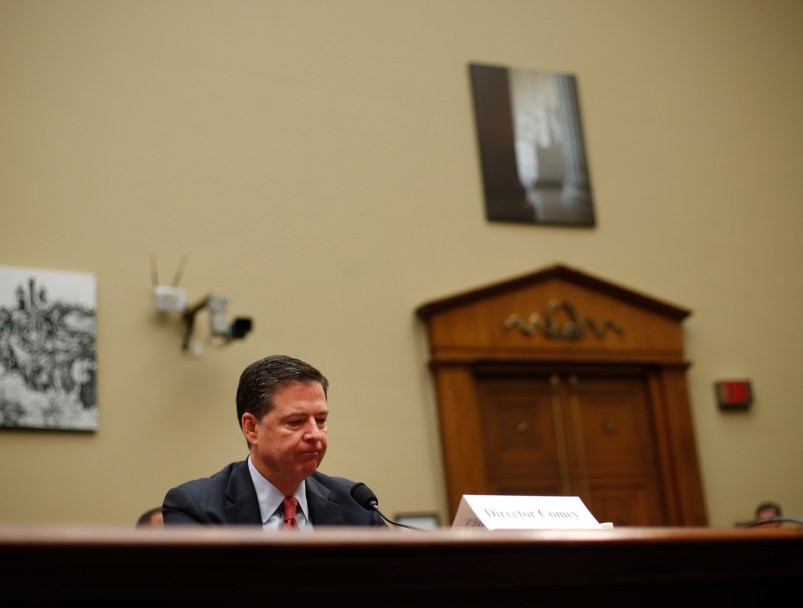It would seem that basically everyone at the FBI is leaking their sides of various internal disputes and turf wars, largely tied to various investigations of the Clintons or attempts to start investigations of the Clintons. That alone paints a picture of Director James Comey as having totally lost control of the organization. But the points of dispute themselves, well ….
The WSJ’s Devlin Barrett seems to have become the chief conduit of choice for anti-Clinton agents at the FBI, as I mentioned over the weekend. This new piece is somewhat more evenhanded, possibly. But I’m not sure the facts of the matter would make it possible to make the pro-investigation agents case not seem iffy. Here’s a rather telling paragraph …
Much of the skepticism toward the case came from how it started—with the publication of a book suggesting possible financial misconduct and self-dealing surrounding the Clinton charity. The author of that book, Peter Schweitzer—a former speechwriting consultant for President George W. Bush—was interviewed multiple times by FBI agents, people familiar with the matter said.
It is worth noting that not only is Schweitzer a former Bush-era operative, the book was funded by one of the organizations Steve Bannon runs inside the Breitbart media empire. Yes, it really was – Bannon, who ran Breitbart News and is now on leave to run the Trump campaign.
I think a fair read of the conventional wisdom on the Schweitzer book was that it found a number of instances where there could be at least a perception of a conflict of interest between State Department actions and Clinton Foundation activities. But in no cases did Schweitzer demonstrate that there were actual quid pro quos. The Uranium One story was probably the best example of that.
The piece goes on to explain that FBI agents interviewed Schweitzer multiple times about his investigation – fairly big red flag right there. They then obtained recordings of a suspect in an unrelated public corruption case who talked about “alleged deals the Clintons made.”
The upshot, from Barrett’s reporting, is that basically everyone at the Justice Department thought the investigators didn’t really have anything. Seemingly, that opinion was shared among senior officials at the FBI. But the agents, who seem to have started the digging basically on their own, were sure they did. They were repeatedly told to move on, they didn’t have anything. But they seemed to keep pursuing it regardless.
It’s complicated to make sense of just what’s going on in this article. As I wrote earlier, I think the agents pushing these probes have the reporter’s, Barrett’s era. But certainly both sides get a hearing in this story. Regardless, given what we’ve seen with the emails probe, the backstory to the Comey letter, this pretty iffy would-be Clinton Foundation investigation and even the weirdness two days ago with the sudden release of the Marc Rich documents (though that may be nothing), there’s very little to shake Democrats of their longheld belief that the rank and file of the FBI has a strong Republican lean (like most law enforcement, to be fair) and that that not infrequently bleeds out in high profile public corruption probes – especially when it comes to the Clintons.
If investigations remain confidential, the damage of politicized probes is limited. But you seem to have a pretty toxic situation with FBI agents pursuing probes prosecutors believe have little merit, leaking to congressional Republicans and finding various ways to force their probes into the public.
Nancy Pelosi had some pretty harsh, albeit coded words for Comey today in an interview with CNN. But it’s hard not to say they have merit.
PELOSI: I think he made a mistake on this and he clearly has a double-standard when it comes to Donald Trump and — keep him out of it. When it came to the hacking by the Russians, that the highest confidence of our intelligence community says that the Russians did this. I know it privately because being hacked by the Russians and he says, well, it’s too close to the election to talk about that. And yet it’s not too close to the election to talk about the e-mails that he says may not be significant. So I think he made a mistake and these jobs, if you’re not in it for a while, you can’t take the heat. And I think he just couldn’t take the heat from the Republicans. It’s really unfortunate because I do believe he is a good person. Maybe he’s not in the right job.
CNN: Do you think he should resign?
PELOSI: I’m not going to that place. I think we have to just get through this election and just see what the casualties are along the way.
Again, lightly coded but harsh. I think the talk about not being able to “take the heat” and maybe not being “right [for the] job” is mainly trolling. But a Director should be able to control this stuff and stand up to political pressure. He has not been able to do either.






